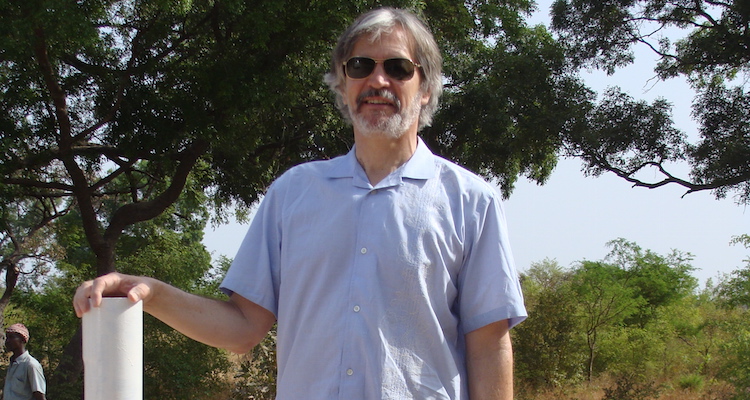Listen Now
David Hess was commissioned as a U.S. Foreign Service officer with USAID in 1980. During his career with USAID, he served as Project Development Officer in the West Africa regional office in Cote d’Ivoire, Rural Development Project Officer in Peru, Director of the Alternative Development Office in Bolivia, Program Officer in USAID’s Africa Bureau in Washington, D.C., Supervisory Program Officer in Guinea, Environment and Energy Officer in India, Supervisory Program Officer in Rwanda and Deputy Mission Director in Mozambique. His final USAID assignment was Director of USAID’s Office of Natural Resources Management in Washington, D.C. Since retirement in 2006, Hess has worked for Conservation International as Vice President for Asia programs; the Millennium Challenge Corporation as Senior Director for environmental and social assessment; International Resources Group Senior Manager for the environmental and natural resources division; and USAID/PPL Bureau as consulting Senior Adviser for strategy and project design. He currently serves as a consulting senior adviser for strategy, project design and monitoring and evaluation for USAID Tanzania. You can connect with David here: https://www.linkedin.com/in/david-hess-02323447
IN TOR 064 YOU’LL LEARN ABOUT:
- David’s account of the recent evolution of USAID, from personal experiences to institutional learning.
- The trends he sees at a macro level (in technology, the economy, politics) and the way they have started to influence development and institutions.
- The difference between leading one of the most reputable institutions in global development, and looking from the outside as a consultant.
- Progress in more rigorous work and more scientific and evidence based approaches.
OUR CONVERSATION INCLUDES THE FOLLOWING:
Organizations
- USAID
- Peace Corps
- Bill Gates, The Bill & Melinda Gates Foundation
- Barack Obama, The White House
Topics
- Consulting and advice
- Strategy and design
- Megadonors
- Public-private partnerships
- Scientific based measurement (impact evaluation)
- Drug trade
- Information and communication technologies
- Social entrepreneurship
Places
- California
- West Africa
- Cote D’Ivoire
- Peru
- Bolivia
- Washington, DC
- Guinea
- India
- Rwanda
- Mozambique
- Tanzania
- Mali
EPISODE CRIB NOTES
USAID aftermath Current advisor, ‘facilitates cheerleading,’ funding USAID programs in Tanzania. General oversight. Technical work, all about strategy, development portfolio, relationships. More fun now. Frustrations are actually receding, Obama has done good things with the Department. The doubts are about once Obama leaves office. Organize your path Peace Corps then graduate school is a common path, but why? Not necessarily wrong, the problem arises when it’s not a conscious choice. However there is value in academic experience, like analyzing a problem and data skills. Aid changes since he got in David has been involved in cutting edge work. Megadonors (Gates). More rigorous, scientific measurement of efforts. Multilateral donors, private-public partnerships. Evolution of partnerships A lot of innovation as of late. Partnerships are not requirements. USAID establishes more precise partnering guidelines. Local NGOs are more relevant, help international ones obtain more funding. The role of USAID in global development It has established the agenda. It is trying to be more involved in local scenarios. Has better ways to show the outcomes of taxpayer funded programs. Scientific development David has seen a lot of success. Peru, a manager realized grants could be coordinated among topics and regions, partnerships led to synergies. It became an example, generated momentum, a movement. David’s account of failure The drug industry. In Bolivia, aid placed restrictions on the help farmers received if they cultivated coca leaves for its potential use in cocaine, which was not the case. Donors benefited, found ways to ‘sneak-farm’ coca leaves as it was a cultural and dietary staple. USAID mindset would take too long to evolve. Anecdote From Bolivia to Mali. A dam project needed to relocate thousands. USAID gets involved in resettling. David’s team gets in the villages, people had never seen strangers or cars. Lot of time before the villagers start to listen. Then it comes choosing the land. Another time, also in Bolivia. On the road, it rains, far from everywhere alone on a truck. Still a worthwhile experience. Trends More access to information will help building global communities and facilitate social entrepreneurship, including funding. Technology also helps in a key activity that is often overlooked: talking to people during the design phase, before getting funding. Advice There is no replacement for grassroots development experience, building strong links to people. Not even a graduate degree. “Find the people’s reality.“ If your project involves a specific skill you don’t have, go online and acquire it.Please share, participate and leave feedback below!
If you have any feedback you’d like to share for me or David, please leave your thoughts in the comment section below! I read all of them and will definitely take part in the conversation. If you have any questions you’d like to ask me directly, head on over to the Ask Stephen section. Don’t be shy! Every question is important and I answer every single one. And, if you truly enjoyed this episode and want to make sure others know about it, please share it now:[feather_share show=”facebook, twitter, linkedin, google_plus” hide=”reddit, pinterest, tumblr, mail”]
Also, ratings and reviews on iTunes are very helpful. Please take a moment to leave an honest review for The TOR Podcast! 



